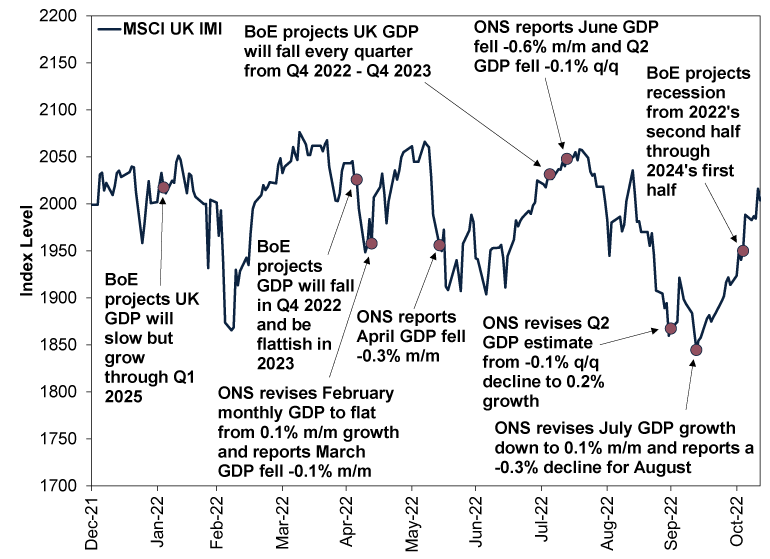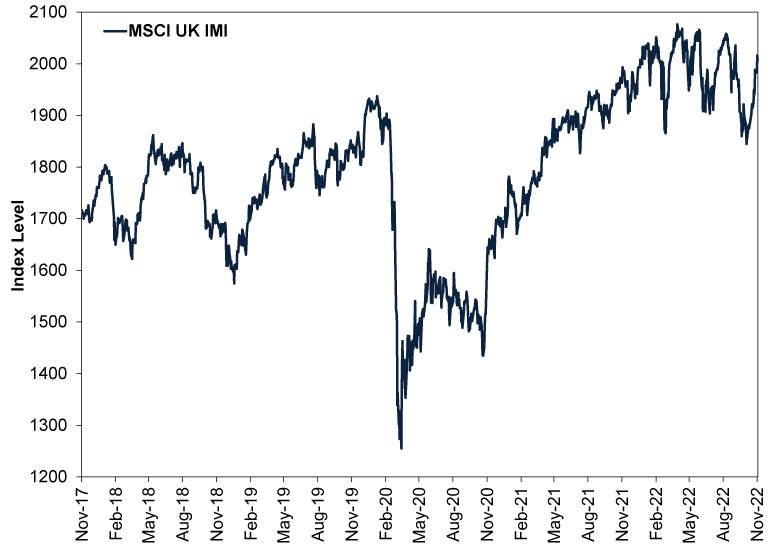Personal Wealth Management / Market Analysis
Weak UK GDP Probably Isn't Sneaking Up on Stocks
Recession chatter from commentators we follow has swirled for months.
UK gross domestic product (GDP) fell -0.2% q/q in Q3—the first major nation to announce a contraction last quarter—and most commentary we read portrayed the decline as just the start of a long-gruelling recession.[i] After all, whilst the Office for National Statistics (ONS) reported September’s monthly GDP had some artificial downward skew from the late Queen’s funeral bank holiday, cost-of-living pressures ramped up in October as the household energy price cap reset higher.[ii] Many political analysts we follow warn Chancellor of the Exchequer Jeremy Hunt will dial up the pain with tax hikes and spending cuts at this week’s Autumn Statement. In our view, the UK economy is pretty clearly weakening, and obstacles lie ahead. Yet from an investing standpoint, we see more cause for optimism than gloom. UK recession chatter from commentators we follow isn’t new, and we think its power over stocks seems to be waning. Moreover, with sentiment so low, the potential for positive surprise seems high, in our view—we think reality has a very low bar to clear.
We didn’t see much to cheer in either the Q3 or September GDP releases, both of which hit Friday. September’s -0.6% m/m decline may have been milder without the extra bank holiday, which shut most retail and services, but the ONS warned this explains only half of the service sector’s -0.8% monthly contraction.[iii] The rest appears to stem largely from cost-of-living pressures, which knocked consumer-facing services hard, extending August’s -1.6% m/m drop.[iv] Heavy industry eked out slight monthly growth, but that stemmed primarily from power and other utilities and mining, which includes oil production. Manufacturing, meanwhile, was flat overall, but that was because growth in pharmaceutical products and transport equipment offset declines in high-tech and commodity-heavy industries—more evidence of pressure from rising costs, in our view.[v] Meanwhile, for Q3 overall, most positivity came from government spending and investment, whilst household spending and business investment declined. Net trade (exports minus imports) added a solid contribution, but imports’ -3.2% q/q drop played a big role in this.[vi] Whilst this adds to GDP, it could represent weakening demand as the weak pound raised costs.[vii]
Mind you, we think it is a mistake to extrapolate any of the above forward. GDP reports tell you what just happened in the broad economy, not what will happen. They aren’t predictive, and our research shows some variability from month to month or quarter to quarter is normal. Moreover, the ONS initially reported a -0.1% q/q contraction in Q2 GDP before revising their estimate to 0.2% growth.[viii] Q3 results could get a similar boost as more data come in. They could also be revised downward, but we are highlighting possibilities here, not assigning probabilities. Fiscal policy is a wildcard for now, in our view, but even the rumoured austerity isn’t necessarily a huge negative, to us. The last time the UK launched an austerity programme, total public spending grew by less than originally planned but didn’t contract outright.[ix] More tax hikes could squeeze households, but the aspects of former Prime Minister Liz Truss’s mini-budget that have so far survived—including the reversal of a small national insurance tax hike and some assistance for household energy costs—could be a partial offset. This is all very much wait-and-see, in our view.
But for stocks, we think a lot of this is probably just too far in the weeds. In our experience, investors en masse don’t sit around trying to calculate the impact of every fiscal policy tweak. Rather, notwithstanding short-term volatility, we think markets assess a simple question: What does the likely path of corporate earnings look like over the next 3 – 30 months compared to what everyone anticipates? In our view, it is the gap between these two—reality and investor sentiment—that determines stock prices in the mid-to-longer term. So for stocks, we think the crucial question isn’t whether the UK has entered recession or not, but whether a weakening economy is a big shock.
We don’t think it is likely to be much of a surprise. Exhibit 1 overlays the MSCI UK Investable Market Index (IMI) and this year’s major economic news and forecasts. As you will see, markets have been dealing with worsening data and forecasts all year. The Bank of England (BoE) has projected a late-year recession since early August. Yet UK stocks are up markedly from 12 October’s low and closed last Thursday slightly positive year to date, making Britain one of the best-performing countries in the developed world. Even in dollars, the UK is the fourth-best performing country in the MSCI World Index this year, despite having had one of the worst economic outlooks for months.[x] Overall, it sure seems to us like UK stocks are dealing with a lot of commentators’ recession talk in advance and moving on.
Exhibit 1: UK Stocks Have Dealt With Recession Chatter for Months

Source: FactSet, Bank of England and Office for National Statistics, as of 14/11/2022. MSCI UK IMI total return with gross dividends, 31/12/2021 – 11/11/2022. Please see the Annex at the end of this article for a longer-term version of this chart.
This, by the way, isn’t unusual, according to our research. When a stock market downturn accompanies a recession, we find stocks usually move first and are typically down considerably by the time the recession becomes apparent. Sometimes they begin recovering before the recession even becomes official. Other times, the downturn lasts a bit longer, then rebounds before the economy does. When the eurozone endured its 2011 – 2013 debt crisis and recession, eurozone stocks retested their low in euros for the last time in June 2012, but GDP continued falling through Q1 2013, nearly nine months into a new regional bull market (a long period of generally rising equity prices).[xi]
In our experience, it is all impossible to time with precision—and all turning points are clear only in hindsight—but stocks don’t wait for the economy. Therefore, we think it would be mistaken to see negative GDP as a reason to turn pessimistic on UK stocks now.
Annex
A Longer Look at UK Stock Returns
[i] Source: ONS, as of 11/11/2022. GDP is a government-produced measure of economic output. A recession is a sustained decline in broad economic output.
[ii] Source: ONS, as of 11/11/2022.
[iii] Ibid.
[iv] Ibid.
[v] Ibid.
[vi] Ibid.
[vii] Source: FactSet, as of 14/11/2022. British pound per US dollar on 30/9/2022.
[viii] Source: ONS, as of 11/11/2022.
[ix] “Public Spending Statistics: July 2022,” Government of the United Kingdom, 20/7/2022.
[x] Source: FactSet, as of 14/11/2022. Statement based on MSCI World Index constituent country returns with net dividends, USD, 31/12/2021 – 11/11/2022. Currency fluctuations between the pound and the dollar may result in higher or lower investment returns.
[xi] Source: FactSet and Eurostat, as of 14/11/2022. Statement based on MSCI Economic and Monetary Union Index return with net dividends, EUR, 18/2/2011 – 4/6/2012, and eurozone GDP, Q1 2011 – Q1 2013. Currency fluctuations between the pound and euro may result in higher or lower investment returns.
Get a weekly roundup of our market insights.
Sign up for our weekly e-mail newsletter.

See Our Investment Guides
The world of investing can seem like a giant maze. Fisher Investments UK has developed several informational and educational guides tackling a variety of investing topics.





